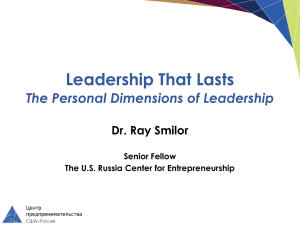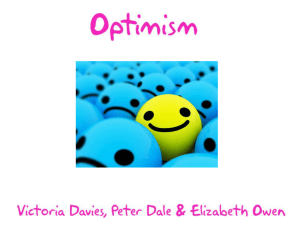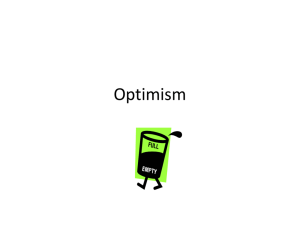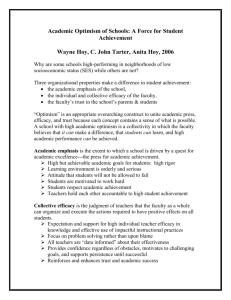The Role of Optimism on Nutrition and Health Behaviors This
advertisement
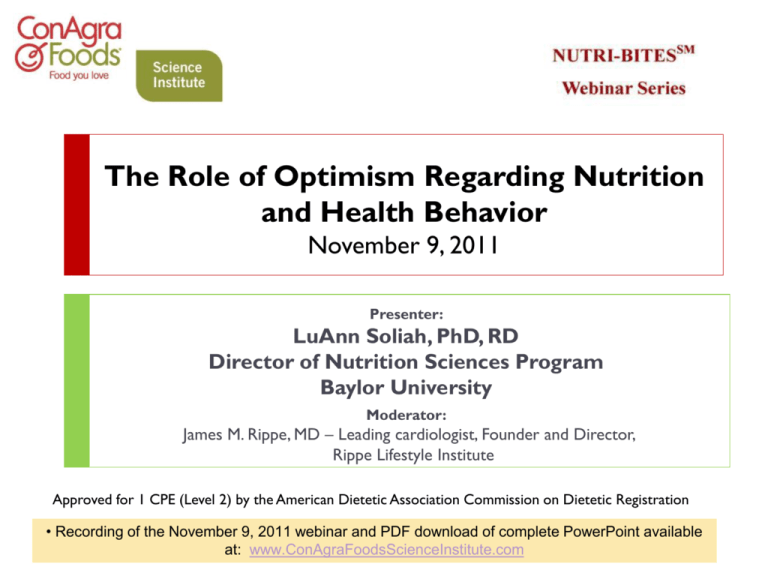
The Role of Optimism Regarding Nutrition and Health Behavior November 9, 2011 Presenter: LuAnn Soliah, PhD, RD Director of Nutrition Sciences Program Baylor University Moderator: James M. Rippe, MD – Leading cardiologist, Founder and Director, Rippe Lifestyle Institute Approved for 1 CPE (Level 2) by the American Dietetic Association Commission on Dietetic Registration • Recording of the November 9, 2011 webinar and PDF download of complete PowerPoint available at: www.ConAgraFoodsScienceInstitute.com Nutri-Bitessm Summary The Role of Optimism on Nutrition and Health Behaviors This webinar covered: Measurements of optimism including the Life Orientation Test (LOT) and the LOT-Revised Research on the association between optimism and health behaviors, specifically related to eating behaviors Strategies health professionals can use in counseling to help clients approach health and nutrition changes optimistically Nutrition and health are well connected. Evidence: Nutrition is related to several major diseases Nutrition is a fundamental component of growth, healing, and overall well-being Appropriate nutrition is related to reduced rates of mortality, morbidity, disability, and frailty in the elderly Nutrition is related to improved workplace productivity and reduced health care costs Source: U.S. Department of Health and Human Services. Healthy People 2010. http://www.healthypeople.gov Life Orientation Test (LOT)...12questions Some examples include: * I am a believe in the idea that “every cloud has a silver lining” * It’s easy for me to relax. * Things never work out the way I want them to. Life Orientation Test-Revised (LOT-R)….10 questions * If something can go wrong it will. * I don’t get upset too easily. * In uncertain times, I usually expect the best. Source: Scheier et al. Health Psychol (1985). Scheier et al. Cogn Th Res (1992). Wenglert et al J Mgmt (1995). Ylostalo et al Eur J Oral Sci (2003). Health * improved physical and mental health * enhanced physical and social function * lower stress levels Well-being * * * * * * * goal achievement confident about the future determined effort to achieve goals problem-focused coping strategy higher quality of life better self-observation increased health awareness Source: Smith et al. J Health Psychol. (2004). Wrosh et al. Qual Life Res. (2003). Live longer, heal faster Higher levels of health Health conscious, physically active Better nutrition Spiritual growth Interpersonal relations Stress management Health self-responsibility Source: Scheier et al. Health Psychol (1985). Mulkanna et al. Am J Health Behav. (2001). Ylostalo et al. J Dent Res. (2003). MEN Simplistic, pleasureoriented relationship with food Warm, chewy, and hearty food WOMEN Complicated relationship with food Restrained eating Dieting Disordered eating Sweets/fatty food for comfort Source: Kiefer et al. J Men’s Health and Gender (2005). Fraser et al. Prev Med (2000). Guthrie et al . J Am Diet Assoc (2000). Weinstein et al. Appetite (1997). Optimism Higher education Older age Greater social support Fewer stressful events Higher scores on mental, physical and general health goal setting Source: Tinker et al. J Am Diet Assoc. (2007). Consistent attendance at dietary educational sessions Self-monitoring behavior Contact with counselors The Life Orientation Test (LOT and LOT-revised) were developed to assess individual differences in generalized optimism versus pessimism. The LOT and LOT-R are research instruments, not intended for clinical applications. Five point scale – no set cut point for optimism/pessimism, adds additional dimension A = I agree a lot B = I agree a little C = I neither agree nor disagree D = I disagree a little E = I disagree a lot Source: Scheier et al. Cogn Th Res (1992). Scheier et al. J Pers Soc Psychol. (1994). 1. In uncertain times, I usually expect the best. 2. It’s easy for me to relax. 3. If something can go wrong for me, it will. 4. I’m always optimistic about my future. 5. I enjoy my friends a lot. 6. It’s important for me to keep busy. 7. I hardly ever expect things to go my way. 8. I don’t get upset too easily. 9. I rarely count on good things happening to me. 10. Overall, I expect more good things to happen to me than bad. Source: Scheier et al. Cogn Th Res (1992). Scheier et al. J Pers Soc Psychol. (1994). Listen/observe/watch for clues of behavior state (pessimism/optimism) Personally, be aware of our own self-talk Read about optimism and positive psychology Remind clients about favorable events, progress, positive changes (small steps) Print/type/use LOT-revised instrument (Scheier et al. Distinguishing optimism from neuroticism: a reevaluation of the LOT. J Pers Soc Psychol. (1994); 67:1063-1078.) Journal articles Tinker LF, Rosal MC, Young AF et al. Predictors of dietary change and maintenance in the Women’s Health Initiative Dietary modification trial. J Am Diet Assoc. 2007; 107:1155-1165. Seligman ME. Csikszentimihalyi M. Positive psychology: An introduction. Am Psychol. 2000; 55:5-14. Seligman ME, Steen TA, Park N, Peterson C. Positive psychology progress: Empirical validation of interventions. Am Psychol. 2005; 60 (5):410-421. Books Handbook of Positive Psychology (2001) CR Snyder & SJ Lopez (editors) Authentic Happiness (2003) ME Seligman A Psychology of Human Strengths (2002) LG Aspinwall & UM Staudinger Flourishing (2002) CM Keyes, J Haidt, ME Seligman Key research search words: optimism, resilience, learned optimism, hope, perseverance, persistence
